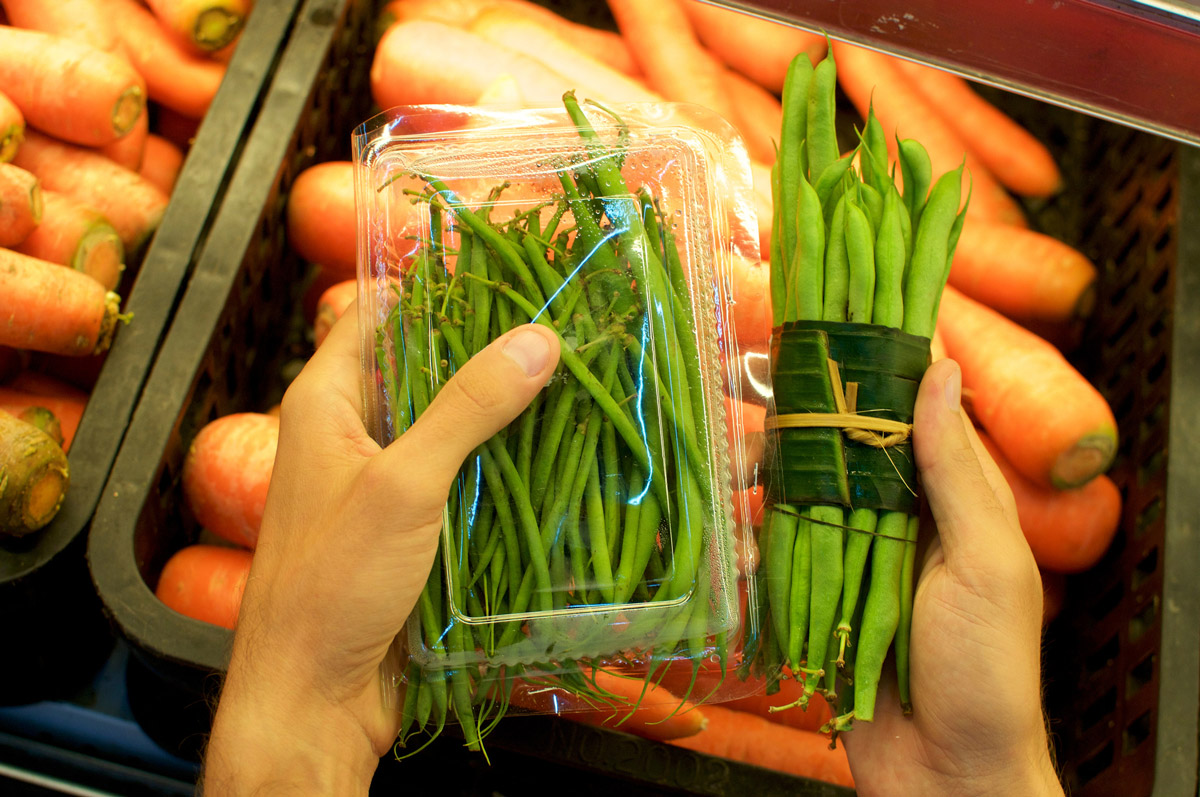This year, Women's Day aligns with the inaugural surge in e-commerce marketing following the New Year. Have you completed your shopping spree yet? According to data from the National Bureau of Statistics, China's total online retail sales reached 13.79 trillion yuan in 2022, with an increase of 4% year-on-year. Among these, the online retail sales of physical goods amounted to 11.96 trillion yuan, accounting for 27.2% of the total retail sales of consumer goods.
How can we swiftly address and reduce the ever-growing waste generated by delivery and takeaway services? What steps can society take to make e-commerce packaging more sustainable, specifically by minimizing the reliance on single-use plastics, curbing excessive packaging, and reducing waste overall? As e-commerce entities and packaging vendors, what strategies can we implement to guarantee the safe and convenient delivery of products to consumers, while also offering ample environmentally friendly choices?
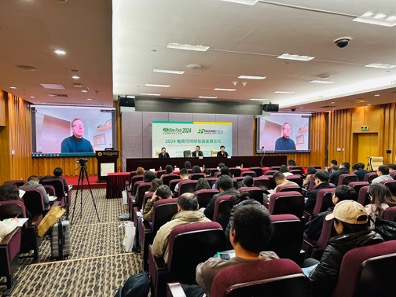
To address these questions, on the afternoon of March 4, 2024, a sustainable packaging forum host by the Guangdong Association of Circular Economy and Resource Comprehensive Utilization and the Plastic Free China, supported by Alashan SEE Pearl River Project Center, Huidu Environmental (Shanghai) Co., Ltd., the Guangdong Express Packaging Industry Green Development Alliance, and the Guangdong Packaging Technology Association was held in Guangzhou at the China Import and Export Fair Complex. The forum, conducted both online and on-site, linked pioneers in circular packaging from around the globe with leading Chinese enterprises, facilitating "mythical dialogues" within the industry to promote domestic and international industry exchange and dialogue.
The forum received support and attention from senior management departments and leaders of related units. Attendees included Luan Fang, the Deputy Director of the Guangdong Province Department of Industrial Energy Saving and Comprehensive Utilization; Qian Wang, the Deputy Director of the Department of Energy Conservation and Comprehensive Utilization Guangzhou Municipal Bureau of Industry and Information Technology; Shangde Xian, the Vice President and Secretary-General of the Guangdong Provincial Association for Circular Economy and Resource Comprehensive Utilization, and Min Ren, the General Director of Adsale.
1. Collaboration Across the Board: Packaging Green Governance Enters an Era of Whole-Chain Management
Zhijian Fu, Chief Engineer of the Guangdong Provincial Association for Circular Economy and Resource Comprehensive Utilization, made an exciting call to action in his welcoming speech, "Packaging production enterprises should undertake the design of packaging reduction, product producers should optimize product packaging design, sellers should demand green product packaging and minimal packaging from suppliers, and consumers should adopt environmentally friendly purchasing, reuse, moderate consumption, and reduce the consumption of single-use plastic products."
Professor Huanzheng Du, one of the earliest scholars focused on the research of the circular economy and resource recycling industry, who also serves as the Dean of the UN Environment Programme-Tongji University College of Environmental and Sustainable Development and President of the China Synthetic Resin Association Plastic Recycling Committee, offered three expert suggestions on the development trend of sustainable packaging:
"First, integrate sustainable packaging with national green production and lifestyle; second, address packaging issues through resource recovery and circularity; third, solve packaging issues across the entire chain. Especially for e-commerce packaging, it involves many links from product producers, merchants, logistic companies to consumers, and recyclers to solve."
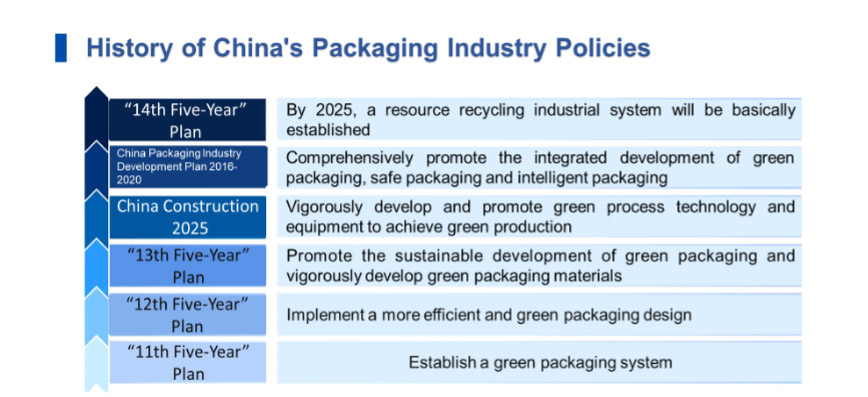
In response to the public’s concern about the environmental benefits of sustainable e-commerce packaging, Xue Zheng, the General Secretary of the Plastic Free China, highlighted with relevant data that the reuse model, as a globally recognized environmental solution, can contribute to a 20% reduction in plastic pollution, a benefit that cannot be overlooked.
As an environmental organization deeply involved in the delivery and takeaway sector, Plastic Free China has its observations and development suggestions for the circular delivery and takeaway model. Xue Zheng summarized that the government plays a crucial role in establishing a circular model. Under the current policy framework, the support for these policies at the local level still needs implementation, and it's essential to lower the initial costs for businesses.
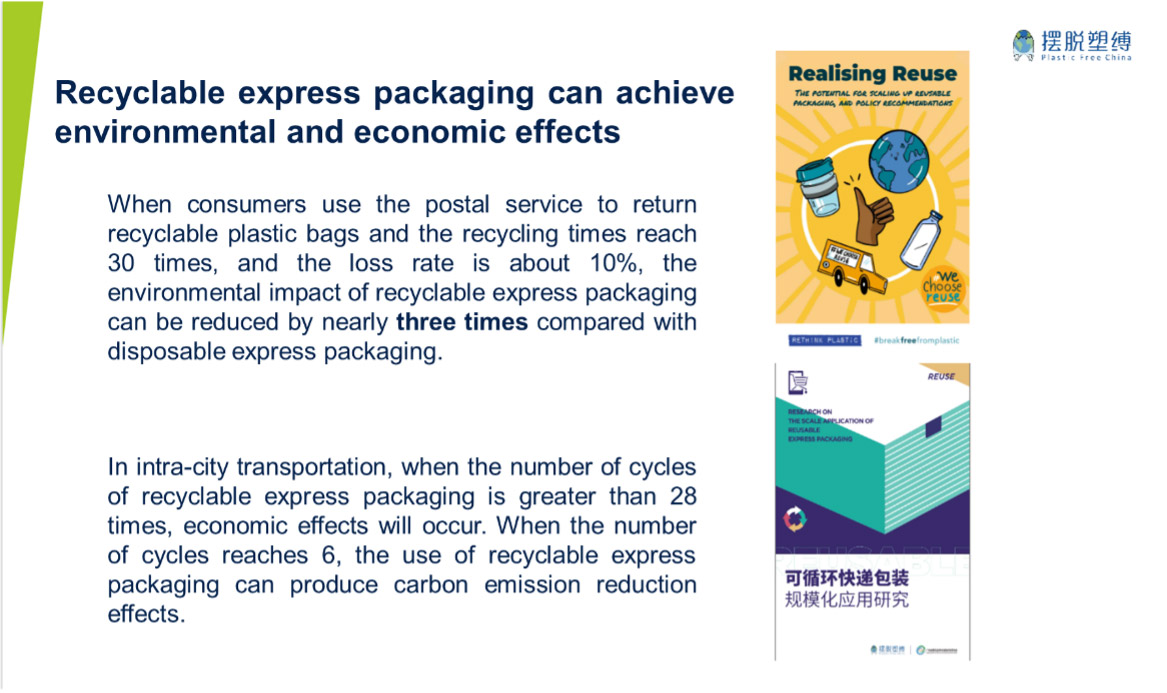
Especially in terms of establishing related sharing and recycling systems, the government needs to act as a coordinator. Circular models, including delivery and takeaway, involve communication and collaboration among multiple stakeholders, requiring participation from various parties including consumers, and entities like government departments, associations, and charitable organizations play a significant role in facilitating this communication.
2. Creating a Wider Circular System Worldwide: Sustainable E-Commerce Packaging from Finland is also made in China
In the realm of e-commerce logistics packaging, Procter & Gamble, with its 187-year history, holds a significant voice. Today, over 50% of P&G's business comes from e-commerce. Wanmin Yang, Director of Supply Chain Packaging Innovation at P&G China, introduced the innovative "Air Capsule" circular box to the attendees. P&G has effectively achieved the goal of 80% of its business operations not requiring secondary protection by leveraging its "direct-to-consumer capabilities, actively expanding and creating direct e-commerce packaging, designing products suitable for the Chinese e-commerce environment through research, and developing green integrated packaging materials to reduce the need for secondary protection.
Contrary to a global FMCG giant like P&G, Huidu Environmental Technology is a tech company dedicated to the R&D, production, and operation of green, environmentally friendly circular packaging products. Discussing the challenges faced by circular packaging suppliers, Ruize Wu, Vice President of the South China branch of Huidu Environmental Technology Co., Ltd., stated that understanding and accepting the concept of "circularity" by customers, along with their awareness of the environmental benefits brought by circular systems, pose external challenges for Grayscale. Internally, the continuous development of product R&D capabilities, denser warehouse network layouts, more stable operational plans, and systems are goals that the company aims to achieve through ongoing accumulation.
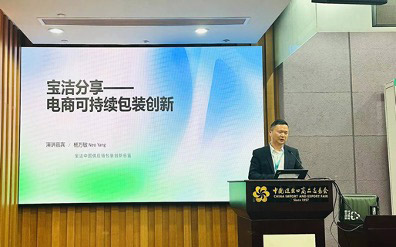
Challenges similar to those faced by sustainable packaging companies in China are not unique. Jonne Hellgren, CEO and co-founder of Finnish sustainable packaging company RePack, mentioned that in Europe, where RePack's operations are concentrated, although their system is primarily based on the postal system, most circular and reusable systems are often "fragmented". Educating consumers and building a stronger circular system remains a significant challenge for businesses in the related industry.
It's noteworthy that RePack's collapsible packaging, adopted in the Asian market, is manufactured in China. Its superior quality and excellent foldability have made this packaging product very popular.
For companies supplying circular express packaging, advanced design technology and cost issues represent significant challenges faced by the entire industry. Wanmin Yang was candid about not fearing competition in terms of cost, stating, "If there are manufacturers who can produce at a lower cost than us, we can cooperate with them." Procter & Gamble's "Air Capsule" technology has also been made available for industry use. Roundtable participants unanimously agreed that only by expanding the industry, and continuously testing and verifying technology, can costs be reduced and efficiency improved, truly welcoming a "scale effect" and sustainable future for circular packaging.
3. Observing China's Takeaway Food Circular Packaging: A Strong Foundation for Scale, Awaiting Comprehensive Management Policies
Yichao Wang, co-founder and COO of Shuangti, points out that the university setting, with its relatively closed environment, enables schools to directly apply administrative measures. This unique ecosystem, where both the supply and demand are concentrated, paves the way for the efficient implementation of reverse logistics. Additionally, the student population is generally more receptive to new ideas and environmental initiatives. Hence, universities offer an ideal testing ground for advancing the use of circular takeaway food containers.
Shuangti has established an intelligent food container system based on the closed environment of schools, utilizing built-in chips and unique identification codes to smoothly track the entire distribution, sorting, recycling, and inventory of food containers. As of May 2023, in the pilot project at the Southern Medical University Shunde Campus, the average yearly circulation of each food container reached 63 times, helping the school reduce the use of 400,000 disposable plastic food containers.
Muuse is a smart platform for reusable packaging focused on Asia and North America. The company uses QR codes and RFID tags to track reusable containers, allowing users to easily borrow and return items among different participating merchants and return stations, and has established an effective management system to solve the problem of reverse logistics. Jonathan Tostevin, the founder of Muuse, participated in the forum's roundtable session online. He believes that the return rate of reusable takeaway food containers is crucial, and Muuse's reusable container return rate has reached 98%.
The construction of circular food takeaway food container systems, the improvement of policies and regulations, and how to better advocate for consumers and address hygiene issues became frequently mentioned key topics by roundtable guests.
Junmian Li, the founder of Laigewan (Shenzhen), emphasized that in addition to cooperation with takeaway platforms and catering businesses, the perfection of related legislation and policies is especially important for the development of the industry. Yi Ding, the roundtable host and the project manager of the Plastic Free China—Express Plastic Reduction project, added that the industry urgently needs to establish a comprehensive management system, clarify the regulatory departments for takeaway plastic pollution, and create a better support system to provide businesses with policy incentives and support.

